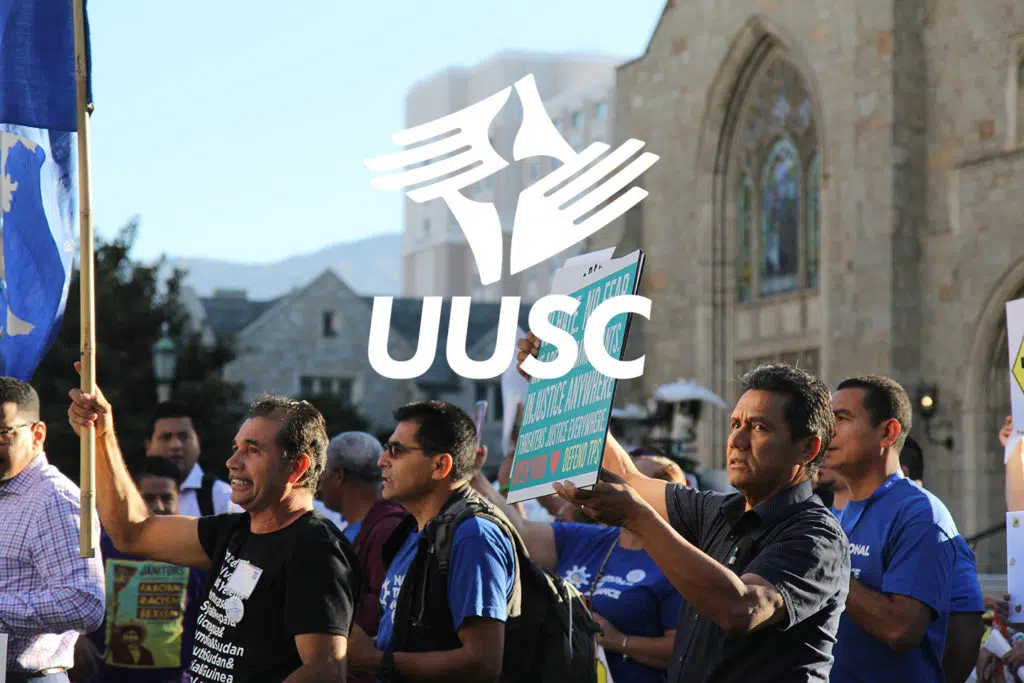The Unitarian Universalist Service Committee (UUSC) is guided by a simple phrase: all people have inherent worth, power, and dignity. Since its founding during WWII, UUSC and supporters have actively pursued innovative ways to address some of the most pressing human rights issues of the day —providing support to people confronting oppression, coordinating relief efforts with community leaders in the wake of disasters, and building networks of coalitions that have grown to span the world today.
Founders, leaders, Board members, and representatives who have been part of UUSC’s history have made significant impacts on the human rights issues they worked to address, all sharing a passion for changing the world for the better.
Their name has become a powerful synonym of what it means to be a human rights advocate. But how much about UUSC do you know? Here are five things you should learn about one of the world’s leaders in change-making.
One: UUSC was established by a couple who were helping refugees escape persecution in WWII.
More than 80 years ago, a minister named Waitstill Sharp and his wife Martha left their home in Massachusetts and traveled to Europe to help Jews and other dissidents fleeing the Nazis. Their dramatic story — smuggling refugees out of Czechoslovakia while barely staying one step ahead of the Gestapo — was chronicled in a Ken Burns PBS documentary, Defying the Nazis: The Sharps’ War. And it has inspired generations of courageous human rights activists.
Despite stalking and intimidation by Gestapo agents and other enemies, frequent pillaging of their offices, and constant fear for their lives, the Sharps courageously committed to their cause. Ultimately, they narrowly escaped themselves and returned to the U.S., where they formalized their mission to advocate for the world’s most oppressed communities – even in the face of conflict.
The eight decades of UUSC’s service and commitment to human rights was celebrated in 2020 during a virtual gala under the theme “Brave Legacy, Bold Future!,” highlighting both the immense bravery of their founders (the Sharps), and encapsulating their fearless approach to advocacy today.
Two: UUSC develops initiatives around three main issues.
Every organization has cause areas that are unique to them, and UUSC is no different: Throughout the years, they have evolved their priorities, redefined themselves, and shifted to meet the needs of the communities they serve.
Today, their strategic priorities are Central American migrant justice, climate justice, and crisis response. Here is a breakdown of what each of those mean:
- Central American migrant justice:
- Background: Thousands of Central America families have been displaced or forced to flee their homes due to violence, persecution, corruption, and gender-based violence. These families migrate in search of safety, which can often mean seeking asylum in Mexico or the U.S..
- Who: People in migration from Central America to Mexico and the U.S. often follow what is known as the “migrant trail.” This route can be dangerous as families are exposed to extreme weather and difficult terrain and are vulnerable to violence and extortion along the way. It can be a struggle to find welcoming areas in which to settle, and many are in need of help navigating complicated asylum systems, finding housing, and gain meaningful employment for steady income.
- How: UUSC’s approach is to partner with community-led organizations along the “migrant trail” to provide support to people in migration throughout the process of relocation. In Mexico, that means working with grassroots organizations who are providing, food, clothing, and shelter to those migrating through or providing legal support to those who seek asylum in Mexico. In the U.S., the focus is on advocating for an immigration system that centers compassion, including a call to end to all forms of detaining children.
- Climate justice:
- Background: Globally, the impacts of the climate crisis are falling most heavily on those who have contributed least to climate change. Rising temperatures and increasingly volatile weather patterns are contributing to shorter growing seasons, disrupting critical agricultural practices, and leaving economies threatened as the crisis deepens inequity.
- Who: Indigenous communities in low-lying areas are experiencing the first effects of the climate crisis. Their lands, waters, and cultures are being threatened by rising sea levels, drought, and saltwater moving into fresh water sources. These changes are forcing communities to decide if they can make adaptations to remain in their homes or if they will be forced to relocate and leave home behind.
- How: UUSC believes that Indigenous solutions are needed to address the climate crisis. They partner with tribes in Alaska, Louisiana, and Pacific island nations to support the needs the tribes themselves identify. UUSC also amplifies the calls of their partners in demanding that governments take meaningful actions to address the climate-forced displacement that is already happening around the world.
- Crisis response:
- Background: UUSC responds to select natural and human-made disasters by partnering with those whose access to aid is most limited, supporting frontline communities as they rebuild their lives on the way to a just recovery.
- Who: While most relief funds raised following a crisis go to large international NGOs, UUSC supports locally-led, grassroots organizations who are best positioned to respond because they are from the affected communities and know their needs.
- How: UUSC understands that when a disaster strikes, people’s situations vary greatly, depending on their intersecting identities, including race, class, and sexual orientation or gender identity. The work begins with an understanding that how people are oppressed before a disaster will affect their access to relief after a disaster. For example, after Hurricane Dorian devastated the Bahamas in 2019, UUSC focused its relief efforts on supporting Haitian immigrants living in the Bahamas. This community has historically faced injustice and discrimination and their access to aid after Dorian was extremely limited.
Three: Their grassroots partnerships make a difference for human rights.
UUSC’s commitment to working in eye to-eye partnership with those directly impacted by injustice is what allows them to respond both thoughtfully and quickly. Their work at its heart is relational —it is the connection over time and the trust that is built that allows for authentic, grounded relationships with grassroots partners. When a crisis hits, that trust is critical as UUSC supports communities in addressing the needs they identify.
Throughout their history, UUSC and their partners have worked together to:
- Provide social services to Navajo communities,
- Establish relief projects for refugees,
- Help desegregate communities in the southern U.S.,
- Send emergency equipment to conflicted areas,
- Fund training to protect potential victims of human trafficking.
The above is only one small snapshot of what they’ve done.
Today, UUSC has grown; but whether they are supporting communities in remote parts of Alaska, Rakine State in Burma, or small Pacific islands, the approach is the same: they listen first.
Four: Independent charity evaluators consistently rank UUSC at the highest possible rating.
You and other generous donors can trust UUSC to put your hard-earned dollars to good work, translating your gift into the largest impact possible. By adhering to the Universal Declaration of Human Rights and maximizing their donations to engage communities and leadership at all levels, UUSC’s work is making a real difference. Beyond grantmaking, UUSC’s participatory action research team investigates and publishes their findings of human rights violations across sectors and regions. These research reports are often the foundation for the changes they advocate for publicly.
Individuals can effect change through easily identified “take action” steps, toolkits are on hand to help communities implement local programs, and impacted communities can call on UUSC for aid and resources in times of urgent need.
By widening their network to include partners, activists, donors, and public and private sectors, UUSC brings the world to a closer, more compassionate place, changing the world one life, and solving one crisis, at a time.
Five: They rely on unrestricted funds to continue their important work.
Unrestricted funds can be critical to organizations like UUSC who need to pivot quickly to respond to global crises. Donations that are pledged through unrestricted funds can be used where they are needed most, letting the charity prioritize and help resolve issues quickly thanks to the flexibility of the funds available.
One of the easiest ways to contribute to an unrestricted fund is in an employee giving program. Whether you work for a private company or public organization, look for UUSC in your program! Here are some things to keep in mind when giving through your workplace:
- Employees have the chance to double their impact through corporate-matching gift programs. Global Impact can help establish these connections, ensuring charities like UUSC can continue their historic efforts to protect and advocate for human rights across all sectors and causes. Learn how.
- Pay attention to special opportunities – sometimes unrestricted gift-giving can even be tripled by UUSC’s partners, striving to make the world a better place by investing where it is most needed.
- And, if you’re a federal employee, you can donate to UUSC through the Combined Federal Campaign (which is only a few short months away) with a recurring, monthly gift.
Want to learn more about UUSC and how you can partner with them? Reach out to us today.




